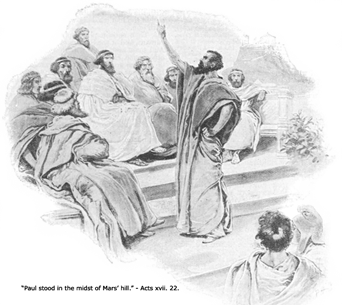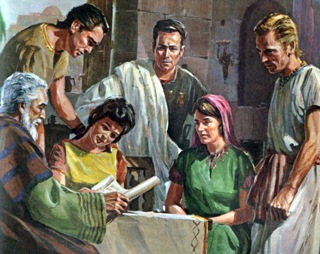A Teachable Spirit
~ Justin Taylor
Only one book is absolutely essential to save us, to equip us to obey God’s will, and to glorify Him in whatever we do. Only one book gives us undiluted truth — the whole truth and nothing but the truth. Only one book serves as our ultimate and final authority in all that it affirms. That book, of course, is the Bible, God’s Holy Word. No wonder John Wesley once exclaimed, “Let me be homo unius libri” — a man of one book!
And yet the irony is that if we use only this book, we may in fact be in disobedience to it. We should count good teaching about the Bible — whether through commentaries, books, sermons, study Bibles, and so on — to be a gift from God for the good of His church (see Ephesians 4:11; James 1:17). So what may look pious on the outside (“Just me and my Bible!”) can actually mask pride on the inside.
Acts 8 describes a story that might help us think through this. An Ethiopian eunuch — a God-fearing  Gentile who served as treasurer to the Ethiopian queen — had made a five-month journey by chariot to Jerusalem in order to worship God. During his return trip he was puzzling out loud over the Isaiah scroll that he held in his hands. And the Holy Spirit appointed Philip to help him understand the meaning of the Bible.
Gentile who served as treasurer to the Ethiopian queen — had made a five-month journey by chariot to Jerusalem in order to worship God. During his return trip he was puzzling out loud over the Isaiah scroll that he held in his hands. And the Holy Spirit appointed Philip to help him understand the meaning of the Bible.
Philip first asked this man if he understood the passage that he was reading (chap. 53). The Ethiopian responded, “How can I, unless someone guides me?” (v. 31). After inviting Philip to sit in his chariot, he asked him about whom this passage spoke. “Then Philip opened his mouth, and beginning with this Scripture he told him the good news about Jesus” (v. 35). Soon after, the eunuch insisted they stop the chariot in order to be baptized by Philip in obedience to his new savior and king, Jesus Christ.
To be sure, this is a historical narrative recounting an event. The purpose is not necessarily to guide believers today in how to read their Bibles or how to think about the teaching of God’s Word. But the elements within it nonetheless correspond to some wise principles we can adopt as our own. So let’s work through the passage again, letting the various points serve as triggers for our own reflection on understanding the Word of God and those who teach it.
First, the Ethiopian wrestles with and labors to understand the meaning of God’s Word. He doesn’t wait for help; he first tries on his own to figure out what the text is saying. He is not content merely to skim the Scriptures, putting a check mark next to his reading in the scroll for that day. And so it is with us — we must spend time in the Bible, working hard and trusting God for insight into its meaning. Paul expressed this as a command followed by a promise: “Think over what I say, for the Lord will give you understanding in everything” (2nd Timothy 2:7).
Second, the eunuch humbly acknowledges his own insufficiency and lack of understanding. He desires to understand what the Word says, he admits that he needs help, and then he asks for it. We should approach God first remembering that He wants to be asked and that He promises to assist us: “If any of you lacks wisdom, let him ask God, who gives generously to all without reproach, and it will be given him” (James 1:5). And what should we pray? Psalms 119 provides many examples of how to pray for understanding and application. For example, verses 33–36:
Teach me, O Lord, the way of
your statutes; and I will keep
it to the end.
Give me understanding, that I may
keep your law and observe it with
my whole heart.
Lead me in the path of your com-
mandments, for I delight in it.
Incline my heart to your testimo-
nies, and not to selfish gain!
Third, the eunuch asks a good, clear, relevant question based upon his own wrestling with the meaning of the text. Asking good questions is evidence of good thinking. If you don’t ask good questions about the text, you won’t engage your mind and you won’t be able to evaluate the answers.
Fourth, he listens carefully to the Christ-centered, gospel-focused teaching before him. Jesus warned that we must take care how we listen (Luke 8:18), and the Ethiopian eunuch does just that. For many of us, our inclination is to talk first and listen second, but Christ-followers must be “quick to hear” and “slow to speak” (James 1:19).
Finally, he puts into practice what he has just learned from the Word and from his commentator. Philip had told him “the good news about Jesus” (Acts 8:35), which probably included the teaching that members of God’s covenant community will publicly identify with Christ in the act of baptism. So the Ethiopian official models for us James’ command to “be doers of the word, and not hearers only” (James 1:22).
So let us be the sort of people who prayerfully and carefully immerse ourselves day and night in God’s Word (Joshua 1:8; Psalm 1:2). Let us also be the sort of Berean-like people who receive good teaching about God’s Word “with all eagerness, examining the Scriptures daily to see if these things were so” (Acts 17:11).
http://www.ligonier.org/learn/articles/teachable-spirit/
© Tabletalk magazine
Permissions: You are permitted and encouraged to reproduce and distribute this material in any format provided that you do not alter the wording in any way, you do not charge a fee beyond the cost of reproduction, and you do not make more than 500 physical copies. For web posting, a link to this document on our website is preferred (where applicable). If no such link exists, simply link to w
ww.ligonier.org/tabletalk. Any exceptions to the above must be formally approved by Tabletalk.
Please include the following statement on any distributed copy: From Ligonier Ministries and R.C. Sproul. © Tabletalk magazine. Website: www.ligonier.org/tabletalk. Email: tabletalk@ligonier.org. Toll free: 1-800-435-4343.
 eager to hear what Paul and Silas had to say, but tested it against God’s prior revelation in the Old Testament before receiving it as a message from God. They had learned to examine everything carefully and hold fast to the truth (1st Thessalonians 5:21).
eager to hear what Paul and Silas had to say, but tested it against God’s prior revelation in the Old Testament before receiving it as a message from God. They had learned to examine everything carefully and hold fast to the truth (1st Thessalonians 5:21). 





A Teachable Spirit
A Teachable Spirit
~ Justin Taylor
Only one book is absolutely essential to save us, to equip us to obey God’s will, and to glorify Him in whatever we do. Only one book gives us undiluted truth — the whole truth and nothing but the truth. Only one book serves as our ultimate and final authority in all that it affirms. That book, of course, is the Bible, God’s Holy Word. No wonder John Wesley once exclaimed, “Let me be homo unius libri” — a man of one book!
And yet the irony is that if we use only this book, we may in fact be in disobedience to it. We should count good teaching about the Bible — whether through commentaries, books, sermons, study Bibles, and so on — to be a gift from God for the good of His church (see Ephesians 4:11; James 1:17). So what may look pious on the outside (“Just me and my Bible!”) can actually mask pride on the inside.
Acts 8 describes a story that might help us think through this. An Ethiopian eunuch — a God-fearing Gentile who served as treasurer to the Ethiopian queen — had made a five-month journey by chariot to Jerusalem in order to worship God. During his return trip he was puzzling out loud over the Isaiah scroll that he held in his hands. And the Holy Spirit appointed Philip to help him understand the meaning of the Bible.
Gentile who served as treasurer to the Ethiopian queen — had made a five-month journey by chariot to Jerusalem in order to worship God. During his return trip he was puzzling out loud over the Isaiah scroll that he held in his hands. And the Holy Spirit appointed Philip to help him understand the meaning of the Bible.
Philip first asked this man if he understood the passage that he was reading (chap. 53). The Ethiopian responded, “How can I, unless someone guides me?” (v. 31). After inviting Philip to sit in his chariot, he asked him about whom this passage spoke. “Then Philip opened his mouth, and beginning with this Scripture he told him the good news about Jesus” (v. 35). Soon after, the eunuch insisted they stop the chariot in order to be baptized by Philip in obedience to his new savior and king, Jesus Christ.
To be sure, this is a historical narrative recounting an event. The purpose is not necessarily to guide believers today in how to read their Bibles or how to think about the teaching of God’s Word. But the elements within it nonetheless correspond to some wise principles we can adopt as our own. So let’s work through the passage again, letting the various points serve as triggers for our own reflection on understanding the Word of God and those who teach it.
First, the Ethiopian wrestles with and labors to understand the meaning of God’s Word. He doesn’t wait for help; he first tries on his own to figure out what the text is saying. He is not content merely to skim the Scriptures, putting a check mark next to his reading in the scroll for that day. And so it is with us — we must spend time in the Bible, working hard and trusting God for insight into its meaning. Paul expressed this as a command followed by a promise: “Think over what I say, for the Lord will give you understanding in everything” (2nd Timothy 2:7).
Second, the eunuch humbly acknowledges his own insufficiency and lack of understanding. He desires to understand what the Word says, he admits that he needs help, and then he asks for it. We should approach God first remembering that He wants to be asked and that He promises to assist us: “If any of you lacks wisdom, let him ask God, who gives generously to all without reproach, and it will be given him” (James 1:5). And what should we pray? Psalms 119 provides many examples of how to pray for understanding and application. For example, verses 33–36:
Third, the eunuch asks a good, clear, relevant question based upon his own wrestling with the meaning of the text. Asking good questions is evidence of good thinking. If you don’t ask good questions about the text, you won’t engage your mind and you won’t be able to evaluate the answers.
Fourth, he listens carefully to the Christ-centered, gospel-focused teaching before him. Jesus warned that we must take care how we listen (Luke 8:18), and the Ethiopian eunuch does just that. For many of us, our inclination is to talk first and listen second, but Christ-followers must be “quick to hear” and “slow to speak” (James 1:19).
Finally, he puts into practice what he has just learned from the Word and from his commentator. Philip had told him “the good news about Jesus” (Acts 8:35), which probably included the teaching that members of God’s covenant community will publicly identify with Christ in the act of baptism. So the Ethiopian official models for us James’ command to “be doers of the word, and not hearers only” (James 1:22).
So let us be the sort of people who prayerfully and carefully immerse ourselves day and night in God’s Word (Joshua 1:8; Psalm 1:2). Let us also be the sort of Berean-like people who receive good teaching about God’s Word “with all eagerness, examining the Scriptures daily to see if these things were so” (Acts 17:11).
http://www.ligonier.org/learn/articles/teachable-spirit/
© Tabletalk magazine
Permissions: You are permitted and encouraged to reproduce and distribute this material in any format provided that you do not alter the wording in any way, you do not charge a fee beyond the cost of reproduction, and you do not make more than 500 physical copies. For web posting, a link to this document on our website is preferred (where applicable). If no such link exists, simply link to w
ww.ligonier.org/tabletalk. Any exceptions to the above must be formally approved by Tabletalk.
Please include the following statement on any distributed copy: From Ligonier Ministries and R.C. Sproul. © Tabletalk magazine. Website: www.ligonier.org/tabletalk. Email: tabletalk@ligonier.org. Toll free: 1-800-435-4343.